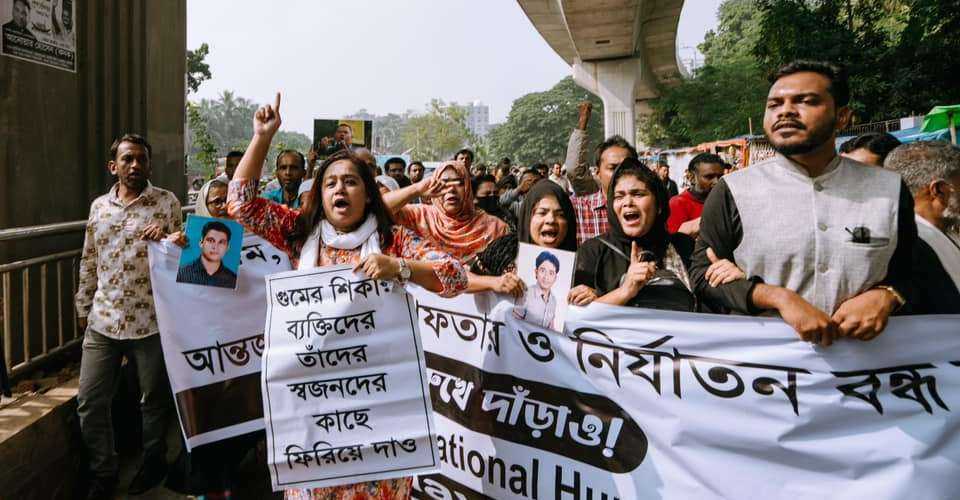
Relatives of the victims of enforced disappearances march on the streets of Bangladesh’s capital Dhaka on International Human Rights Day in 2023 to demand return of their loved ones. (Photo Courtesy: Sanjida Islam Tulee)
Two global human rights groups have expressed concerns over the Bangladesh government’s failure to implement key recommendations related to civic space as part of its Universal Periodic Review (UPR) at the UN Human Rights Council.
Bangladesh’s inability to implement the recommendations highlights the government’s lack of commitment to adhere to its international human rights obligations, CIVICUS Monitor and the Asian Human Rights Commission (AHRC) said in a statement on March 26.
The statement, issued on Bangladesh Independence Day, noted that the authorities were “unwilling to undertake the necessary reforms to improve fundamental freedoms” in the country.
The UNHRC undertook a review of Bangladesh’s human rights record last November. During the review, UN member states made 301 recommendations including on improving civic space.
Bangladesh accepted 211 recommendations and noted the rest, the groups said. The adoption of Bangladesh’s UPR review took place on March 25.
Among the recommendations the government did not accept were calls to amend or repeal the Cyber Security Act made by 15 countries.
The Cyber Security Act passed in September 2023 retains most of the repressive language of the previous draconian Digital Security Act used to criminalize thousands of online critics including activists and journalists.
The government also did not accept recommendations to establish an independent monitoring and investigation mechanism to address allegations of human rights violations committed by police and military personnel and to accept visits by UN special procedures, the statement said.
“It is disappointing that the Bangladesh government has failed to accept recommendations to review the draconian Cyber Security Act, a law which the UN has said threatens the legitimate exercise of the right to freedom of expression,” CIVICUS said.
“Further, the government’s reluctance to establish an independent mechanism to investigate abuses by security personnel highlights the culture of impunity in the country,” it added.
On a positive note, the government has accepted seven recommendations to ensure that human rights defenders, journalists, and civil society have a safe and enabling environment and can operate freely without fear of reprisals.
It also accepted recommendations to investigate, hold accountable and prosecute, as appropriate, members of security forces and others who have committed human rights violations and abuses.
“If the government is serious about protecting human rights defenders and civil society it should start by quashing the two-year conviction of human rights defenders Adilur Rahman Khan and Nasiruddin Elan, ending the judicial harassment of Nobel Laureate Mohammad Yunus and halt the targeting of activists and journalists including those in exile,” the AHRC said.
Khan and Elan were jailed last September for working to document thousands of alleged extrajudicial killings, enforced disappearances of opposition activists, and police brutalities.
Yunus is facing a host of lawsuits over alleged corruption in various organizations he founded.
Bangladesh “should also investigate police abuses during recent protests by the political opposition, garment workers and others and bring the perpetrators to justice”, the AHRC added.
The downgrade is the result of a massive government crackdown on opposition politicians and independent critics in the run-up to national elections this January, CIVICUS had said.
source : uca news
